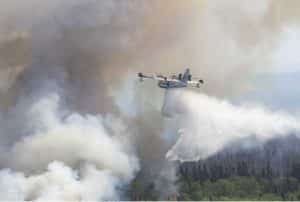
(FAIRBANKS, Alaska) — Now that warmer weather is finally here and we’re heading into the first summer holiday, more people are getting outdoors whether to do some spring cleaning, recreating or sightseeing in our beautiful state. The best way to keep our state beautiful is by making sure you don’t start a wildfire.
People who live and recreate in fire-prone lands assume a certain level of risk and responsibility. Fires threatening people, communities and homes are fought aggressively, but public and firefighter safety is always the top priority. Alaska is vast and fire managers use different strategies to protect people and homes. However, naturally occurring fire in the boreal forest is necessary for habitat and wildlife diversity. Situations may arise where fires are used to reduce the risk of large wildfires during dry summers and to prevent an unnatural aging of the forest.
“We encourage everyone to enjoy all the opportunities to recreate that Alaska provides, and please be careful with any activities that could start a wildland fire, whether barbequing or having a campfire,” said Kent Slaughter, manager of the BLM Alaska Fire Service – one of the three wildland fire protection agencies that provides suppression services in Alaska. “Also, keep the hot exhaust system on an engine away from dry, dead vegetation such tall patches of grass or a pile of leaves that could ignite a fire.”
While spring green-up is a little late in some parts of Alaska, the lack of rain has left dead surface fuels very dry and susceptible to ignition. Despite multiple burn permit suspensions, the Division of Forestry & Fire Protection continues to respond to numerous burning activities that have resulted in several wildfires. As of Thursday, 70 of the 72 fires ignited so far this year were human-caused. Thankfully, except for the Barley Way Fire near Delta Junction, most were quickly extinguished. That could change as the summer progresses and the deeper ground layers dry out.
Burn permits are required on all state, municipal and private lands that do not have a local government burn permit program in effect. Using burn barrels, burning small woody debris piles, or burning lawns all require a small-scale burn permit from April 1-Aug. 31 in Alaska. Burn permits are free and available at local Forestry & Fire Protection offices, many local fire departments and online for printing at https://forestry.alaska.gov/burn. They also provide helpful instructions on how to conduct safe burning practices.
“We know people are going to be out camping, hiking, boating, barbecuing, and enjoying other forms of recreation over the holiday weekend. We just ask them to be extremely careful when it comes to the potential for starting wildfires and to be sure to have a burn permits for any debris pile or lawn burning,” said Norm McDonald, Division of Forestry & Fire Protection’s Chief of Fire and Aviation.
Campfires 3 feet or less in diameter with flame lengths less than 2 feet high do not require a burn permit and are allowed during a burn permit suspension. Fire managers always advise caution when burning a campfire in hot, dry and windy conditions. Some wildfires have started from abandoned campfires that people thought were sufficiently extinguished but, with a little wind, kicked back to life and quickly spread.
The consequences of a wildfire in a populated area with high values at risk are substantial. Wildfires can not only put the public and emergency responders in danger but also impact the livelihood of community members.
Here are some tips to ensure you don’t spark a wildfire when outside, especially while enjoying your Alaska adventure:
- Never leave any fire, even those in burn barrels, unattended for even a short time. It only takes a matter of a few seconds for a fire to spread out of control if you are not prepared.
- Clear areas around campfires down to mineral soil to reduce the chances of escapement.
- Keep campfires small and manageable.
- Have tools and water on hand to prevent fires from escaping.
- Make sure campfires are completely extinguished before you leave them by repeatedly drowning them with water and stirring the coals and ashes until they are cold to the touch.
- Dispose of barbecue ashes or coals in a fireproof container; do not dump them in the woods.
Call 911 immediately if there is a wildland fire emergency.
It is also essential to be aware of the risk of wildfires in your area and to take steps to prepare for them. This can include creating defensible space around your property, having an evacuation plan, and keeping a supply of emergency food and water on hand. Individuals may utilize Firewise principles to reduce fire risk to their homes, property and communities.
Remember, you are responsible for any fire you start.
For statewide fire information, call (907)356-5511 or visit the Alaska Interagency Coordination Center website at https://fire.ak.blm.gov or go to http://akfireinfo.com.
[content id=”79272″]

